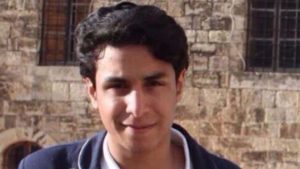Press Release 13 October 2009
UN human rights chief criticizes latest execution of juvenile offender in Iran
GENEVA – The UN High Commissioner for Human Rights Navi Pillay said Tuesday she was deeply dismayed to hear that another juvenile offender was executed in the Islamic Republic of Iran on Sunday, and called for changes to Iranian law and practice “to end execution of juvenile offenders once and for all.”
She also said she had serious concerns about the death sentences recently handed down to three individuals for their involvement in the protests that took place after Iran’s recent Presidential election.
Behnoud Shojaie, who was executed on Sunday, had been convicted of the murder of another boy in a street fight when both were 17 years old. Both the UN High Commissioner for Human Rights and UN special rapporteurs had raised his case with the Iranian authorities, reminding them of their international obligation not to execute juveniles.
Iran is a party to the International Covenant on Civil and Political Rights (ICCPR) and to the Convention on the Rights of the Child, both of which prohibit the death penalty for juvenile offenders.
The High Commissioner had welcomed indications that the Iranian judiciary was encouraging victims’ families to reach private settlements in such cases. The former head of the judiciary had previously agreed to suspend Shojaie’s death sentence, in order to give the victim’s family a chance to pardon him under Islamic Shariah law.
A new draft juvenile justice law, which is currently being considered by the Iranian legislature, provides a valuable opportunity to end the execution of juvenile offenders.
“This latest execution shows there are no guarantees of clemency for juveniles until Iran changes its law and practice to end execution of juvenile offenders once and for all,” Pillay said. “It is the state’s responsibility to stop these executions, not a family’s prerogative.”
The High Commissioner also raised concern over Iranian state news agency reports that three people have been sentenced to death in relation to protest activities following the recent Presidential elections. Reportedly, the verdicts must be confirmed by a higher court.
“Under international law, the death penalty can only be applied when very strict conditions are met, for example only in respect of the most serious crimes and only after scrupulously fair trials,” the High Commissioner noted. The UN human rights mechanisms have held the view that the imposition of the death penalty for crimes that do not result in loss of life is contrary to the ICCPR. “There are also major concerns about the way the recent trials of opposition activists were conducted, and I hope these judgments will be reviewed carefully by the higher courts,” Pillay said.
Beyond the question of legality of the death penalty under international law, the High Commissioner reiterated that she is opposed to the death penalty in all circumstances, and urged governments to act on the UN General Assembly’s February 2008 Resolution which called on all states “to establish a moratorium on executions with a view to abolishing the death penalty.”
ENDS
OHCHR Country Page – Iran: http://www.ohchr.org/EN/Countries/AsiaRegion/Pages/IRIndex.aspx
Learn more about the UN High Commissioner for Human Rights, Navi Pillay: http://www.ohchr.org/EN/AboutUs/Pages/HighCommissioner.aspx
For more information on OHCHR mandate and work: http://www.ohchr.org/EN/Pages/WelcomePage.aspx
Office of the High Commissioner for Human Rights – Media Unit
Rupert Colville, Spokesperson: + 41 22 917 9767
Xabier Celaya, Information Officer: + 41 22 917 9383
For inquiries and media requests: press-info@ohchr.org



